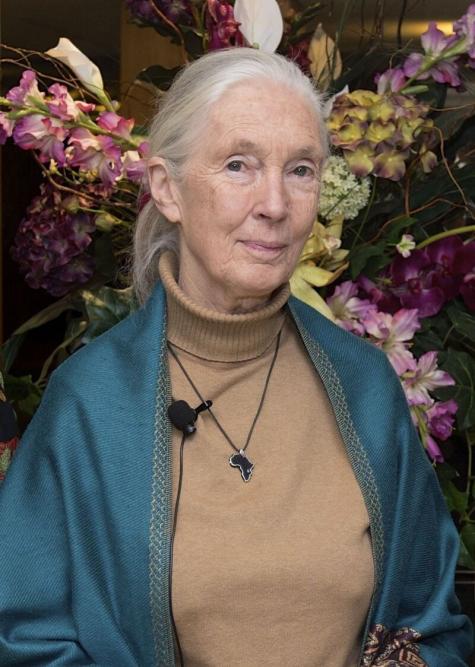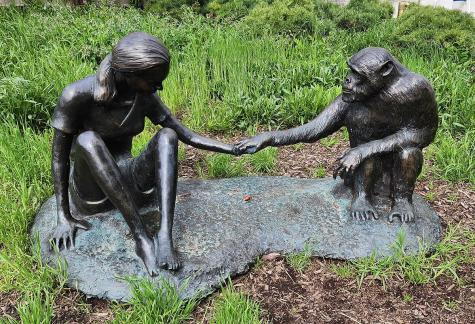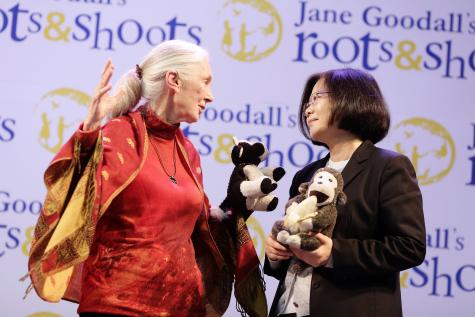Jane Goodall (UK)

➡️ JANE GOODALL (1934-2025) - Inspirational Ethnologist, Conservationist & Humanitarian
After her recent passing, we pay tribute to the late Jane Goodall and celebrate her life, which she dedicated to science, conservation, and the protection of our planet's biodiversity.
Goodall is most famously known for her work studying the behaviour of chimpanzees in Tanzania's Gombe Stream National Park, where, at the age of just 26, with no formal qualifications, she spent an initial 15 years studying chimpanzee behaviour in their natural habitat.
Her 60 years of study uncovered groundbreaking discoveries, which she coupled with conservation and activism of not just chimpanzees but also environmental education, climate change, youth empowerment, and her inspirational message of hope.
"Let us develop respect for all living things. Let us try to replace violence and intolerance with understanding and compassion. And love." - Jane Goodall
Jump straight to our resources on ➡️ Jane Goodall
Explore our comprehensive guides on -
-
The Climate Crisis

Goodall’s Scientific Discoveries
Jane Goodall's unorthodox approaches allowed her to gain insights which changed the way the world perceived chimpanzees and what it means to be human.
-
In one of her first discoveries, Goodall learnt that Chimpanzees make and use tools, specifically twigs, to fish for termites.
-
Chimpanzees hunt and eat meat; they are not vegetarians as previously thought, but are omnivorous and consume pigs, monkeys, and other small mammals.
-
Conflict is not reserved only for humans. Chimpanzees also engage in violence against rival groups and were observed killing members of their own species.
-
Chimpanzee mothers have very strong bonds with their offspring. Siblings also form strong familial bonds.
-
Just like humans, chimpanzees are capable of compassion. Goodall observed chimpanzees comforting mourning members of their group and were witnessed adopting orphaned chimps.
These observations made during Goodall's long hours of studies in the field made huge contributions to our knowledge of chimpanzees and also how to save them from extinction. It showed that traits we previously thought were only human are not unique, but are present in other animals. Her work also helped contribute to the genetic evidence that humans are closely related to chimpanzees, which helped to shift our perspective on evolution.
Goodall's work also paved the way for other women in primatology, conservation, and science. She broke through barriers and showed the world that women, too, can pursue their passions in traditionally male-dominated fields.
The Jane Goodall Institute & Roots & Shoots
Founded in 1977, the Jane Goodall Institute was established to continue her research and expand chimpanzee protection efforts. It has now grown into a global nonprofit for the conservation of all wildlife and the environment. With a focus on environmental education, they work to inspire young people to create change in their own communities and beyond. Their mission is to inspire hope through action and build a world where people, animals, and the environment thrive together.
Goodall later founded the Roots and Shoots conservation movement in 1991. It was founded with a group of students in Tanzania who wanted to help make the world a better place, and is now a worldwide network with almost 5,000 youth-led projects.

Other Notable Achievements
In 1963, Goodall had her first article (which made the cover story!) published in National Geographic. This became part of a long line of publications, books, documentaries, and even a podcast.
In her many decades of work, she founded chimpanzee sanctuaries and established programmes to tackle poverty and support sustainable livelihoods. She was named a UN Messenger for Peace in 2004 by then Secretary-General Kofi Annan for her work in creating a more peaceful world.
Even at the age of 90, Goodall was travelling 300 days of the year to spread her message of hope through action. In her final message to the world in an interview which was released shortly after her passing, she said that she would like to launch Donald Trump, Elon Musk, Vladimir Putin, Xi Jinping, and Benjamin Netanyahu on a one-way trip into space.
Beyond her scientific contributions, Goodall is a global beacon for conservation, peace, sustainability, and the protection of our planet's biodiversity. Her work continues to inspire countless individuals and is a reminder of the urgent need to preserve our Earth for future generations.
"What you do makes a difference, and you have to decide what kind of difference you want to make." - Jane Goodall
Author: Rachael Mellor, 20.10.25 licensed under CC BY-SA 4.0
For further reading on Jane Goodall see below ⬇️
- Jane Goodall Institute107401
- Roots & Shoots International239648
- Roots & Shoots UK107402
- Jane Goodall Institute - fb107405
- Jane Goodall - Wikipedia107403
- Jane Goodall - UN Messenger for Peace491178
- Books (amazon)107409
- Google Images107408
- Google News107407
- Jane Goodall's message of hope - YouTube291209
- Nat Geo - Jane Goodall - Special collection239644
- Jane Goodall: A Life in Pictures - Britannica 484567
- Time 100 - Jane Goodall by Leonardo DiCaprio239646
- Jane Goodall - National Geographic 484570
- YouTube - Jane Goodall107404
- @JaneGoodallInst107406
- Where in the World is Jane? - Jane Goodall Institute484562
- "𝑬𝒗𝒆𝒓𝒚 𝒔𝒊𝒏𝒈𝒍𝒆 𝒐𝒏𝒆 𝒐𝒇 𝒖𝒔 𝒎𝒂𝒕𝒕𝒆𝒓𝒔. 𝑬𝒗𝒆𝒓𝒚 𝒔𝒊𝒏𝒈𝒍𝒆 𝒐𝒏𝒆 𝒐𝒇 𝒖𝒔 𝒎𝒂𝒌𝒆𝒔 𝒂 𝒅𝒊𝒇𝒇𝒆𝒓𝒆𝒏𝒄𝒆 𝒆𝒗𝒆𝒓𝒚 𝒔𝒊𝒏𝒈𝒍𝒆 𝒅𝒂𝒚. 𝑨𝒏𝒅 𝒘𝒆 𝒉𝒂𝒗𝒆 𝒂 𝒄𝒉𝒐𝒊𝒄𝒆. 𝑾𝒉𝒂𝒕 𝒔𝒐𝒓𝒕 𝒐𝒇 𝒅𝒊𝒇𝒇𝒆𝒓𝒆𝒏𝒄𝒆 𝒂𝒓492332
- Jane Goodall: Hero - Tribute to Dr. Goodall for her 80th birthday in 2014 - Dr. Jane Goodall & the Jane Goodall Institute USA 28.10.16494693
- A primatologist inter pares - Ecologist 16.10.25494316
- Jane Goodall revolutionized animal research, but her work had some unintended consequences. Here's what we've learned from them. - Live Science 15.10.25494076
- Jane Goodall: A Voice Of Hope For Iran’s Environmentalists - Forbes 15.10.25494075
- Jane Goodall spent her life telling humans to honour animals - Economist 09.10.25494077
- Jane Goodall’s Final Message: ‘Don’t Give Up’ - Inside Climate News 07.10.25494078
- Jane Goodall on Donald Trump, Elon Musk and hope in Netflix’s new posthumous interview series - Euronews 07.10.25494079
- Dr. Jane Goodall’s Final Message To The World | Famous Last Words | Netflix (must watch) - Still Watching Netflix 06.10.25497434
- Jane Goodall obituary: pioneer primatologist who inspired generations of scientists - Nature 06.10.25492183
- Conservationist Jane Goodall: 'The biggest problem is greed' - DW 06.10.25492185
- In Final Message of Hope, Jane Goodall Suggests Blasting Trump and Other Hateful Right-Wingers Into Space - CD 06.10.25492184
- Video: Passage: Remembering Jane Goodall - CBS News 05.10.25492186
- Why we need more Jane Goodalls - Conversation 03.10.25491904
- Remembering Jane Goodall, Who Taught the World How to Be More Humane - CD 03.10.25 491887
- Jane Goodall, world-renowned primatologist, dies aged 91 - Guardian 01.10.25491104
- Jane Goodall, pioneering primatologist, conservationist and activist, dies at 91 - France24 01.10.25491105
- Jane Goodall On Voting To Save The Planet, And Why Male Politicians Are Like Chimpanzees - The Late Show with Stephen Colbert 26.09.25497462
- Adelaide conservation groups celebrate the work of Dr Jane Goodall - ABC 15.08.25484565
- Jane Goodall: Trophy hunters threaten endangered animals - Wild Be I´m Wild 07.08.25484563
- 'They hold hands, they embrace, they kiss': The woman who changed our view of chimps - and human beings - BBC 14.07.25484564
- Jane Goodall chimpanzee conservation project in Tanzania hit by USAID cuts - Guardian 17.06.25484568
- Jane Goodall: ‘We must let local wisdom and science be our guides’ - Observer 09.06.25484566
- Jane Goodall Taught You How to 'Look' - NY Times 04.04.25492182
- Jane Goodall: “We've sent a rocket up to Mars, yet we’re not intelligent” - Unesco 06.01.25484569
- Jane Goodall: An Inside Look (Full Documentary) | National Geographic - National Geographic 23.04.24497417
- Female photographers celebrate Jane Goodall’s 90th birthday - Guardian 03.04.24407161
- Jane Goodall at 90: On fame, hope, and empathy - Mongabay 03.04.24406153
- Audio: Jane Goodall – Speech at the Evening of Hope in Munich 2023 - Good News For You 30.12.23393277
- The human-chimp bond captured in an iconic photo - BBC 23.06.23355713
- Video: Matching the topic! - Good News For You 04.05.23393278
- Jane Goodall: ‘People are surprised I have a wicked sense of humour’ - Guardian 18.02.23330470
- Book: The Book of Hope: A Survival Guide for Trying Times - Jane Goodall, 2021258498
- As Jane Goodall grieves climate change, she finds hope in young people's advocacy - NPR 18.10.21258499
- Jane Goodall wins Templeton Prize for work at intersection of science and spirituality - Mongabay 20.05.21245204
- Why Jane Goodall is hopeful in 2021 - BBC 19.03.21239552
- Jane Goodall on the simple steps we should all take to save the planet - Vogue 14.10.20239647
- My talk with Jane Goodall: vegetarianism, animal welfare and the power of children’s advocacy - Conversation 28.07.20239650
- Honouring Jane Goodall, and 60 years of pioneering research with Great Apes - UNESCO 14.07.20239651
- We must protect chimps from being exposed to covid-19 - New Scientist 22.04.20239652
- Jane Goodall Video Message for JGI Staff, Volunteers & Roots & Shoots Members 3/20202967
- Jane Goodall keeps going, with a lot of hope (and a bit of whiskey) - NY Times 9/19239645
- Jane Goodall on Leonardo DiCaprio, her 85th birthday, and the need for hope - Mongabay 4/19239649
- Jane Goodall at COP21: "I’m Here to Save the Rainforests" from Intensive Farming, Corruption - DN 12/15107410
- Chimps with everything: Jane Goodall's 50 years in the jungle - Guardian 6/10239553
- Video: Jane Goodall - What separates us from chimpanzees? - TED 2003239551
- Video: Jane Goodall - UN Messenger of Peace 2002491179